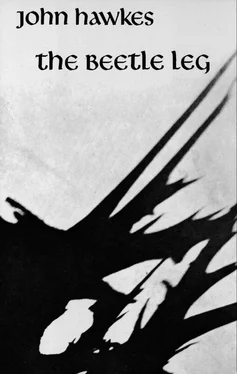John Hawkes - The Beetle Leg
Здесь есть возможность читать онлайн «John Hawkes - The Beetle Leg» весь текст электронной книги совершенно бесплатно (целиком полную версию без сокращений). В некоторых случаях можно слушать аудио, скачать через торрент в формате fb2 и присутствует краткое содержание. Год выпуска: 1951, ISBN: 1951, Издательство: New Directions, Жанр: Современная проза, на английском языке. Описание произведения, (предисловие) а так же отзывы посетителей доступны на портале библиотеки ЛибКат.
- Название:The Beetle Leg
- Автор:
- Издательство:New Directions
- Жанр:
- Год:1951
- ISBN:978-0811200622
- Рейтинг книги:4 / 5. Голосов: 1
-
Избранное:Добавить в избранное
- Отзывы:
-
Ваша оценка:
- 80
- 1
- 2
- 3
- 4
- 5
The Beetle Leg: краткое содержание, описание и аннотация
Предлагаем к чтению аннотацию, описание, краткое содержание или предисловие (зависит от того, что написал сам автор книги «The Beetle Leg»). Если вы не нашли необходимую информацию о книге — напишите в комментариях, мы постараемся отыскать её.
The Beetle Leg
Newsweek
The Beetle Leg
The Beetle Leg — читать онлайн бесплатно полную книгу (весь текст) целиком
Ниже представлен текст книги, разбитый по страницам. Система сохранения места последней прочитанной страницы, позволяет с удобством читать онлайн бесплатно книгу «The Beetle Leg», без необходимости каждый раз заново искать на чём Вы остановились. Поставьте закладку, и сможете в любой момент перейти на страницу, на которой закончили чтение.
Интервал:
Закладка:
“People gave me these things. I’ll keep it with me.” On the other side of the wood and paper wall the old mother and her elder son were quiet. Ma listened for the splash of bare feet on the floor. The heat began to rack her shoulders and she heard only the scraping of the cowboy’s fingers in the basin. He filled it again, trailing slowly down the sand and back.
“He’s washing twice,” thought Ma. She waited, thinking suddenly that she could have had it done in the cabin with the right man driven out from town and her own friends packed into the doorway. The sun brought it to mind, but the feeling passed as she thought of entering those streets that lead to church. She knew that in a moment she would want a long space to cover, a good many miles before sundown.
“Listen,” the water dried on the cowboy’s cheek, “you ain’t aiming to take my mother to this wedding?”
“Yes, I’ve none to turn to.”
Luke tilted the basin, poured, then stopped. He looked up — sky and desert shone tearless, clear, white — and rubbed his eyes. He dropped the bar of soap into the water and swept out the razor. He honed it once or twice against the sun, held it to a side of dry whisker, flourished and pulled. His young face had the acid smell of skin drawn under ingressive heat rays and his fist — it could pull a horse twice round on startled hoofs — was tightly fastened on the crook of the razor. After each stroke he held it outstretched vertically between his eyes. He aimed. The bright scroll on the blade that could twist the trickle of blood, turned white against his cheek.
Placing the razor on the wash box, careful to keep the steel edge free of the wood, he went into the cabin with shoulders hardly moving as he walked.
Before he came back, Ma saw the Indian child, too small to be a maiden, spying around the corner of the milk hut. The fingers of one hand spread stark and wild against the sod.
Ma colored, “You keep away from me today.”
Luke returned with a towel. He rubbed on a fresh spot of soap. “No. She don’t think she’ll dress this morning.” His mouth was hidden by a stiff arm. “I guess she better stay behind.”
“I guess you shouldn’t use his things! On a day like this.”
Luke turned. He saw the hair which was fluffed out and starting to rise, the walnut ears, the fat shadow on the sand.
“He won’t be shaving anymore. Not him.”
Ma rose, laid aside the bag ready for loading, filled a bucket, and started for the coop.
“Don’t wake him,” she said. “Yet.”
That was the day Ma sang. She carried a tune on dry nostrils and the Lampson ranch, by the sound of a woman’s voice, livened in its bed of star thistle. Ma’s song was louder when she passed the cabin, she raised it to leaning walls and the hidden flower of a man culled from the desert.
“My mother says it’s time to start. If you’re going to.”
“I’ll take her in my wagon. You tell her not to bother herself.”
“She says she’ll try to have a meal done when you get back.”
“She can sit by me.”
Three wagons rattled to the edge of the shell, as if they had been camped out of sight until the moment of noon, and slowly continued forward on salty flutes across the sand. Bravely three loads of women in gown and bonnet hymned together; Luke turned to locate the sound of women’s voices, faint, from mouths already closed. He climbed on top of the sod milk hut and under brimmed hands watched the approach of old wives in the dust.
“I’m glad for you. They’ll get here safely.”
Ma smiled.
The desert filled with women. They swarmed within sideboards of beaten wagons, staring ahead for sign of well or a shade in which to dismount and shake. Three cartloads plied the desert. Banded warm members, they traveled free of the farmer and cattle driver, chopped to the roots stray outcroppings of slate colored grass. These were women who rode unwatched on the dry bottom of the lake with empty breasts and nameless horses, and even the oldest unsnapped heavy collars and soured the passing miles from the tail boards where they sat and dangled their weak legs. They nodded to the thrust, the side slapping of the wheels.
“But I believe there’s trouble.” Again Luke climbed to his sod post and waited. Narrowly he glanced at Ma. “Yes, sir. Them women don’t have no water. Not a drop.”
“That’s all right.” Ma passed quickly with the basket. “You don’t draw such things to my attention.”
“Well,” Luke pulled on his hat, “I reckon they’d survive about anything.” He walked away, sat down and watched her.
And those women were roughly able to sing songs of the skewered lamb and waters driven back by faith or oath. They were dry. The boards on which they sat, scraped of fodder, might have burst aflame if the sun were caught briefly in the eye of a watch glass. They traveled in three lifeless dories with dead oarlocks and rotted sails; they sang stiffly, managed to hold the reins. They backtracked, chewed the sand and made their way over weary, salty miles to see one woman their own age brought to bed.
Every one of them made the trip. There was not a woman in the desert who had not left the animal pens, truck garden patch and particular gully of the home to sit all day in the sun, to breathe the air of ancient lying in and love. For hours, under a never swaying skirt, a bare ankle remained chocked against brake iron or plank. The desert gave them up and they advanced; they might have died of thirst. But open-jawed and black, with matted and twisted cuts of hair, they crowded wagons taken from the farm.
They drew near, and Luke for the first time saw women’s faces. Once again on the sod hut, a thin scout in the sunlight, a bent marker limp though standing, his own face worked, pursed and dripping as he watched. Bonnets, ribbons but no curls, skull-blackened and thirsty they stared back above the slick fronts of horses plodding low, stepping singly, flat and without wind away from wheels that were nearly locked. Instead of three wagon loads he would have liked to have seen just one face cleansed of the sun and that had not been formed and set long ago to the sudden bloody impression of a coffin bone. A few could not hear the meek but steady notes of their sisters’ hymns and pushed their ears with hands that had been raised trembling three days and nights. “I want to see one,” he searched among the tucked and tired wives, “before she’s learned to keep shut. And outlive a man.”
He did not wave.
“Smile,” said Ma, “when you’re welcoming.” The sounds of iron pleased her. She would rise and accommodate them too when they actually arrived, not sooner. But once she paused, “Go get her,” Ma hissed, “bring her here.”
Higher than the sod hut or cabin, outnumbering the buildings of the ranch, they broke down in the Lampson yard. They drove across and settled on the ground where Luke had shaved. With spikes and nails working out of the wood, reared loosely above dead wheels, they hid the cabin from corral, cut off the roost. Only two front animals found room to emerge and hang toward the south and open plains on the other side. All those women and a dozen horses mauled in the first enclosure they had found since setting forth. Luke climbed and stepped among them. Little spars, a few carrying flimsy woven heads of sage, balanced with the slack, tipped and dug into the ground. The air was filled, below voices and slowly slobbering bits, with the steady descending sounds of rope and shroud, skirt and ringlet.
Ma, too late, suddenly cried out: “Don’t get down!” Carrying the satchel with both hands, smiling, snapping her eyes, she darted from wagon to wagon. “Keep your seats!”
Luke hid among the horses; he unbuckled them. Bits slipped in and all the way out of crooked mouths, away from square, flat, slanted teeth. Breast collars were hung loose and low and the weight of wagons dragged against forelegs instead of chests. Tight cruppers wrenched the raw high ends of tails, bristling and gray, pink and choked, straight above the mounded rumps and to one side.
Читать дальшеИнтервал:
Закладка:
Похожие книги на «The Beetle Leg»
Представляем Вашему вниманию похожие книги на «The Beetle Leg» списком для выбора. Мы отобрали схожую по названию и смыслу литературу в надежде предоставить читателям больше вариантов отыскать новые, интересные, ещё непрочитанные произведения.
Обсуждение, отзывы о книге «The Beetle Leg» и просто собственные мнения читателей. Оставьте ваши комментарии, напишите, что Вы думаете о произведении, его смысле или главных героях. Укажите что конкретно понравилось, а что нет, и почему Вы так считаете.












